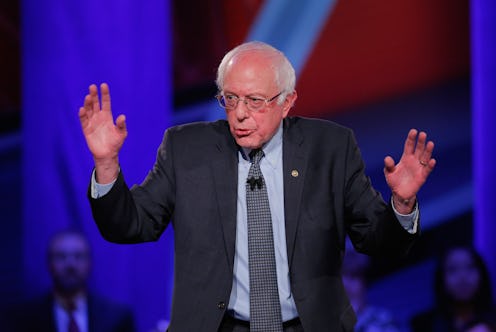News
Sanders Hit With Tough Questions At Dem Town Hall
Bernie Sanders was legitimately taken to task at Monday's Democratic town hall meeting, facing tough questions about his policies, his ideology, and the practicalities of implementing the sort of change that he preaches. Chris Cuomo and the attendees of CNN's event got down to brass tacks, and Bernie Sanders responded to the main criticisms of his campaign as a result.
The first question of the night addressed Sanders' political affiliation. He considers himself not a Democrat, but a Democratic Socialist, and one of the town hall attendees asked him to clear up the definition of that term.
"What Democratic Socialism means to me, in its essence, is that we cannot continue to have a government dominated by the billionaire class and a Congress that continues to work for the interests of the people on top while ignoring working families," Sanders said. "What this campaign is about, and what I believe in, is creating a government that works for all of us, not just a handful of people on the top. That's my definition of Democratic Socialism."
While that may not be a very specific definition, it is a very clear articulation of Sanders' underlying political philosophy: Government policies should not disproportionately benefit the economic interests of the richest Americans. He's made that argument many times throughout the campaign, but for those who haven't been following the campaign obsessively, it's a helpful encapsulation of his views.
Sanders also took several questions about how, if elected president, he would fund his programs. Cuomo asked Sanders if it was true that his health care proposal would require implementing "one of the biggest tax hikes in history."
"That is an unfair criticism for the following reason," Sanders replied. "If you are paying now $10,000 a year to a private health insurance company, and I say to you, hypothetically, you're going to pay $5,000 more in taxes — actually less than that — but you're not going to pay any more private health insurance, are you going to be complaining about the fact that I saved you $5,000 in your total bills?"
The bottom line is that Sanders' policy plank does call for more taxes, and that's a politically unpopular position. By explaining that his tax increases would be more than offset by the elimination of health care premiums, Sanders was emphasizing the fact that higher taxes doesn't necessarily mean less money in Americans' pockets after tax day. Later in the night, when asked once again how he would fund his programs, Sanders mentioned that many of his proposed tax hikes would fall mainly on the rich.
"How am I going to pay to make certain that public colleges and universities are tuition free, and we substantially lower interest rates on student debt?" Sanders asked himself, rhetorically. "I pay for that because we're going to ask Wall Street to pay a tax on speculation."
Granted, Sanders has said much of this before. But what's important is that collectively, these questions embodied the primary criticism of Sanders' campaign, that he's a socialist who wants to raise taxes and can't pay for his proposals. He answered that criticism on Monday night, and his campaign is better off for it.
